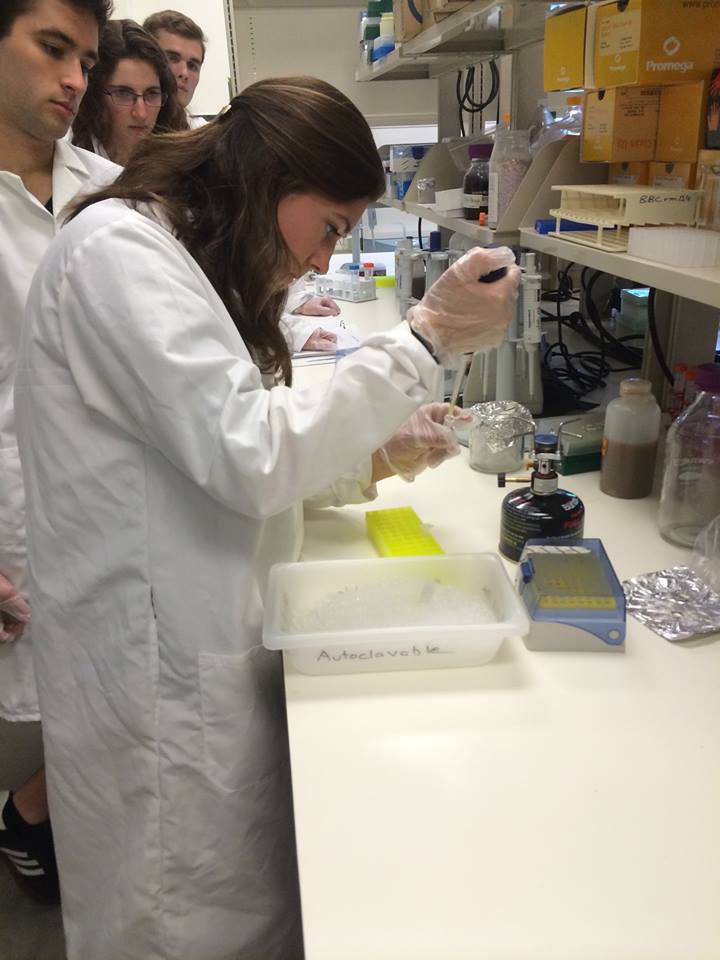Hailey Edmondson
November 4, 2014
By Emma Alexander, Honors Communications Intern

y simply to sustain the earth’s population. However, to ensure the world is fed, it will require more than simply increasing the volume of food produced. Food itself must be made healthier. The way in which we utilize our resources to produce food must be improved. Research and innovation that looks to solves these very problems, among others, is taking place right here on campus, and honors student Hailey Edmondson is playing a key role. Hailey, a junior in Plant Genetics, Breeding, and Biotechnology from San Diego, CA came a long way from home to utilize the opportunities Purdue has to offer. Hailey shared with me that she was thrilled by the research opportunities and strong agricultural programs at Purdue, but was on the fence about attending school here until she visited for Golden Honors Day. Hailey said, “It wasn’t an easy decision to leave paradisiacal San Diego for Indiana, but Purdue is my home away from home and it’s one of the best decisions I’ve made.”
Hailey is very passionate about the degrees she is pursuing, and she has found many ways to further pursue her passions outside of class. She has been a member of Purdue’s iGEM team since her freshman year, serving as the vice president in the previous calendar year. (If you would like to learn more about iGEM, you can read our story here. Hailey is also on the Honors Mentor Council and serves as an Agronomy Ambassador. However, a great deal of Hailey’s contributions on campus has been through research. In fact, Hailey was recently published in the Journal of Purdue Undergraduate Research for her outstanding work.

Hailey’s research career at Purdue began in her very first semester and has progressively developed since then. Her most recent project involves improving the protein digestibility in sorghum grain. Hailey began by explaining the significance of her project.
“The project I’m working on is just one project among hundreds of projects working towards a common goal of feeding the world. That’s the big picture. Sorghum, in particular, is of interest because its agronomic properties are suitable for regions of the world that are food insecure— sub-Saharan Africa, in particular. Creating sorghum varieties with higher yields, better nutritional properties, and greater stress tolerance is important to the growers in those regions. From 2003 to 2013, Africa was responsible for 40% of the world’s sorghum production. It’s a staple crop of the region, and improving it can go a long way for the consumers and producers in that region of the world.
Clearly, this project stands to make an immense impact in the lives of hundreds of thousands of people around the globe. Hailey says an exciting end goal is to improve human nutrition, however, this solution is certainly still in progress.
After getting a better grasp of why this issue is of significance, I asked Hailey to explain more of the details.
Much of the protein in sorghum becomes indigestible when cooked, so its nutritional value in a human diet is limited. We are using sorghum mutants with higher levels of protein digestibility to identify what makes these mutants better and how we can use the mutants to make better lines of sorghum for human consumption. We’ve gotten to the point where we’ve identified individuals with desirable protein digestibility traits and we have a plant population to work with. The article in the Journal of Purdue Undergraduate Research details the project, goals, and findings up to this point.
For all of the details, or if you are interested in learning more, you can read the full article here http://docs.lib.purdue.edu/cgi/viewcontent.cgi?article=1180&context=jpur.
Looking forward, Hailey has high expectations, and she is thrilled to continue working towards the end goal of improving human nutrition. However, Hailey’s interest in crop improvement and food security is not limited to this project and this topic alone. She plans to attend graduate school to continue to grow her knowledge and understanding. Looking even farther into the future, Hailey says,
I really want a career that puts me at the center of innovative agricultural technologies and applying those advances to address important issues in the realm of food security and sustainability. That could be anything from improving nutritional properties of an important food crop, to addressing market accessibility and infrastructure in a developing nation, or even addressing community dynamics and policy in food-insecure regions. It’s all interconnected, and I’d love to be a part of developing and implementing methods to address these challenges. I’m also very interested in entrepreneurship, so I’m excited to see how I can combine that with my interest in food security and international development.
Hailey is a great example of someone who has used the Honors College to its fullest potential by pursuing opportunities and experiences in many facets of the institution. In fact, she credits the Honors College for providing her with a great sense of community and surrounding her with bright, like-minded peers, who have motivated her to pursue her passions. I think it is safe to say that Hailey has certainly had a successful career at Purdue thus far, but it’s not over yet and her goals are great. Many people say they’d like to change the world, but Hailey Edmondson has already taken strides to do so.



